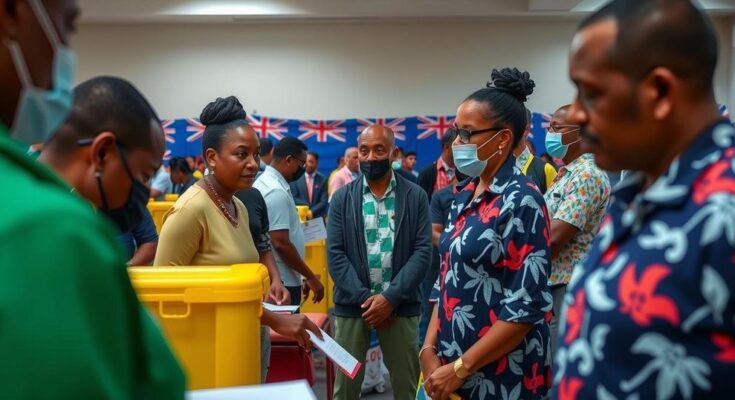Mauritius held a parliamentary election amid a cost of living crisis, with Prime Minister Pravind Kumar Jugnauth and rivals promising economic solutions. Polling opened at 7 am GMT, expecting over a million voters to select from 68 parties for 62 parliamentary seats. Jugnauth’s coalition proposed wage increases and tax cuts, while the opposition promised similar initiatives. Youth engagement in the election was highlighted as crucial, and government restrictions on social media raised transparency concerns.
Mauritius recently conducted a parliamentary election amid a cost of living crisis, which significantly influenced voter sentiment. Prime Minister Pravind Kumar Jugnauth, alongside his main competitors, pledged to address this pressing issue as they sought votes from the approximately 1.3 million residents. Polling commenced at 7 am GMT, with voters checking in before casting their ballots until 2 pm GMT. The island nation has shown remarkable economic growth, mostly stemming from its offshore financial services, tourism, and textile sectors, projected at 6.5% this year, though many citizens do not feel the benefits of such economic performance. The ruling Alliance Lepep coalition has proposed initiatives such as raising minimum wages, enhancing pensions, and reducing VAT on essential goods, leveraging payments from the UK related to the Chagos Islands while continuing to receive assistance from China. Political analyst Subash Gobine noted, “The alliance led by the prime minister is selling the economic prosperity card, with promises of more money to different segments of the population.” Meanwhile, the opposition Alliance du Changement coalition led by Navin Ramgoolam also seeks to increase pensions and introduce free transport and internet services while lowering fuel prices. Youth engagement in this election appeared to be crucial, with voters like David Stafford highlighting the need for economic innovation and job creation. More than a million voters faced the task of selecting legislators for the islands’ 62 parliamentary seats from an extensive list of 68 parties and five alliances. Notably, government-imposed restrictions on social media platforms raised concerns about national security and transparency in the electoral process. There exists significant anticipation regarding the results of this election, which will dictate not only parliamentary composition but also the Prime Minister’s position.
Mauritius, a small island nation in the Indian Ocean, markets itself as a vital connection between Africa and Asia, significantly supported by its offshore financial sector and tourism industry. Economic growth forecasts for the country reflect a robust 6.5% for the current year, which is a slight decline from the previous year’s estimate. Despite this growth, many citizens face everyday financial hardships, spurring a strong emphasis on economic issues during the election cycle. The election saw key promises from both the ruling and opposition parties aimed at alleviating the cost of living crisis and improving citizens’ financial well-being.
The parliamentary election in Mauritius, held against the backdrop of a cost of living crisis, showcased significant voter concerns regarding economic stability and job availability. With promise-driven campaigns from both ruling and opposition parties, the election results will be crucial in determining Mauritius’s political direction and strategies to address the pressing needs of its populace. As the nation awaits results, the electorate’s desire for economic innovation reflects broader challenges faced by many communities in transitional economies.
Original Source: www.sowetanlive.co.za




